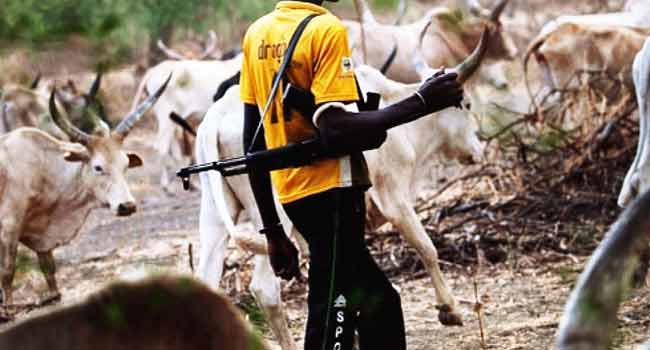By Jeph Ajobaju, Chief Copy Editor
Muhammadu Buhari has voted more than N72 billion to create ranching routes for killer Fulani herdsmen, according to his spokesman, Garba Shehu, not in the least bothered that those dispossessed by the terrorists are left starving.
Garba broke the news of the ranch budget on August 25, a week after Buhari approved the review of 368 grazing routes across 25 states, as he presses on with placing cattle above human beings who are killed daily in the North by Islamist jihadists.
Buhari gives priority to the protection of cows without taking concrete action against Islamist jihadists who abduct school children, collect ransom for their freedom or torture and murder them and post the video on social media.
Picking grains from markets
In Niger State in the North Central, Internally Displaced Person (IDPs) say they now pick grains from the market to eat.
“There is not enough food for us. In fact, for two months now, we have not gotten food from the government or anybody.
“So what I and my children do is to go to the market to pick the grains that fall on the ground when it is being measured for the customer,” said Rayila Bitrus, a 30-year-old in Kuta IDP camp.
“We gather the grains with the sand and when we get home, we separate the sand from the grains and still separate which grain from each other. Then we cook the one we can cook,” she told The Nation.
More than 8 states on queue for ranching booty
Shehu told Channels Television that Ebonyi, Yobe, and Katsina States and the Federal Capital Territory (FCT) have received N24 billion for ranching from the federal government, each collecting N6 billion.
But Ebonyi State Government, Dave Umahi, has denied Garba’s claim that the state collected any money for ranching.
Shehu said the applications of more than eight other states are being processed and they will get theirs soon, and any other interested state that meets the requirements will get the same grant.
“Yes, Katsina has been given, but Katsina is not the only state that has been given. So far, about N24 billion has been disbursed to about four states for ranching and associated activities.
“Yobe has been given. Ebonyi has been given and [the] FCT has been given. More than eight other states are now being processed for this payment,” Shehu explained.
Three states and the FCT got a total N24 billion, which means each received N6 billion. More than eight states queuing up for it will also get N6 billion.
That is, Buhari has ring-fenced at least N72 billion for his ranching project in states while those displaced by the killer herders and other poor Nigeria go hungry.
Buhari also ignores the fact that the Land Use Act of 1978 vests in Governors the control of land in their states, not in the President or the federal government. Or is that probably why he is offering them N6 billion each to coax (call it bribe) them?
Shehu said the programme is one of the ways Buhari intends to end farmers/herders clashes because Buhari is fair and just and wants the clashes to end like every other Nigerian.
NSEMA feigns ignorance of IDPs’ starvation
The Nation reports that Niger State Emergency Management Authority (NSEMA) feigns ignorance of starvation in IDP camps in Shiroro Council.
Yet, the newspaper adds, feeding is a big task for over 2,000 IDPs from communities buffeted by insecurity and banditry and living in two of the IDP camps in the council.
Displaced from the luxury of their homes, these victims, who once boasted of bountiful food, who own farms where they feed people and make their livelihood, now rely on handouts from individuals and donations from the government.
But these foods, when donated, are usually not enough for the large group of people in the camps and are exhausted within a few days.
Rayila Bitrus
With the inability to get steady work but determined to feed their family, most of the women and children in the IDP camps, like Bitrus, go to Kuta market daily to pick grains from the ground to feed.
She said they pick mostly rice, millet, corn, and beans.
“Some days, we get two to three cups while on other days, we get about five cups. This is because we are not the only ones who go to the market for the picking.
“That is what we have resorted to doing now because we are tired of begging for food to eat,” she told The Nation.
Bitrus, like her fellow scavengers, cooks rice and beans together and saves corn and millet until they are enough to make pap. Sometimes the corn is ground for tuwo.
Musa Abdul
The story is the same for Musa Abdul who used to get menial jobs when he first arrived at the camp but the jobs have become scarce and he now doubles as a porter carrying loads for people who buy goods in the market.
“When I go to the market, I go with my children because I notice that when grains are measured for people, a lot falls on the ground and I also notice that a lot of our people here go to the market and pack this food that falls on the ground.
“My children are the ones who pick the grains on the ground. They take them home to their mother who separates the sand from the grains and we manage them for the time they last.
“The days I don’t get jobs, only my children go to the market to pick food.”
Nuhu Hassana
Another IDP, Nuhu Hassana, explained that they have to go to the market early to get a promising space in front of a seller they know may attract customers.
“Once you are there, that space is yours. So any customer that comes, we stay and watch and after filling the bag of the customer, we start packing the ones that fall on the ground.”
She said that is what they rely on because food is very scarce in the IDP camp and it now means that every family must cater for themselves.
Kuta market tells the same story
A visit to Kuta market revealed that the IDPs are saying the truth.
Nuhu Musa, a trader who sells beans, rice and millet, said it is sad seeing women sweeping the ground to get some food to take home for their children.
“If you come new to the market, you may feel that they are trying to keep the market clean when they start sweeping the ground after a customer has gone.
“But they are not cleaning the market. They are sweeping to gather the food that fell on the ground. They will pack it in the bags they bring and take it home. They come as early as 8am and leave at 2pm or 3pm,” Musa told The Nation.
The Nation also saw some women sweeping the ground after customers had brought grains and left.
Getting food, health care top challenges in IDP camps
Daoda Kanneh, Chief Executive Officer of the Development Initiative of West Africa (DIWA) and head of Niger IDP Response Coalition secretariat, confirmed to The Nation that IDPs have challenges of getting food and health services.
“We conducted a needs assessment and profiling on the IDPs. In our assessment, we realised that the IDPs have challenges with health, food, sanitation have been the basic issue they are confronted with.
“A lot of them are farmers and they left their places because of insurgency and they will need support in those areas but most of the time, they complain about no food and health,” he said.
Victims Support Fund (VSF) Executive Director, Nana Tanko, a professor, said his team discovered food scarcity in IDP cams during a scoping mission.
“Our assessment shows that there is a major lack of food. During our scoping mission, we saw IDPs that were living in major food scarcity, they didn’t have food to eat,” said Tanko.
“The needs of the IDPs are so much that the government cannot cope with it and if they do not help themself, your family will suffer.”
NSEMA claims to hear of complaints for the first time
NSEMA Director General Ibrahim Inga said the government is not aware of the scarcity of food in IDP camps.
His words: “All these donors who come to the state pass through the government and the government is having so much in its hands. The government has done wonderfully well as far as the issue of IDPs camp is concerned in Niger state.
“Kuta is not the only local government that is affected by this banditry activity, we have about nine local governments at a point that the situation is hostile and the IDP camps were virtually everywhere.
“If you look at the quantum of the amount of money being expended in providing security, food items, medication, it is on the high side.
“That is why the Governor [Abubakar Bello] had called on kind individuals to come in for support and if we can have support from individuals, then the IDPs cannot complain of not having food.
“The Governor had made it specifically clear that the state cannot do it all alone, that we need kind-hearted individuals to come in and help us. I don’t think there is anything to complain about.
“That they have no food is a complaint that I am hearing for the first time and I will verify it and ensure what is right is done.”
Shiroro Council chairman acknowledges problems
Shiroro Council Chairman Suleiman Chukumba confirmed knowledge of the problems.
“I know the challenges we are facing and what we are doing to help with these challenges. And I know what we are doing to address the problems of the displaced people.
“I will not say that there won’t be complaints because this issue of armed banditry and people becoming displaced has been for a long time, it has been seven to eight years,” he stressed.
“Although we have been doing our best, if some of them are coming to complain a little, it is not something I will wave off because we have been facing this problem for a long time and we have been helping them the best way we can.
“Seven years is not seven days and I am sure that there would be complaints from them.”
Chukumba appealed for more interventions from individuals and organisations to help mitigate the problems in the IDP camps.


